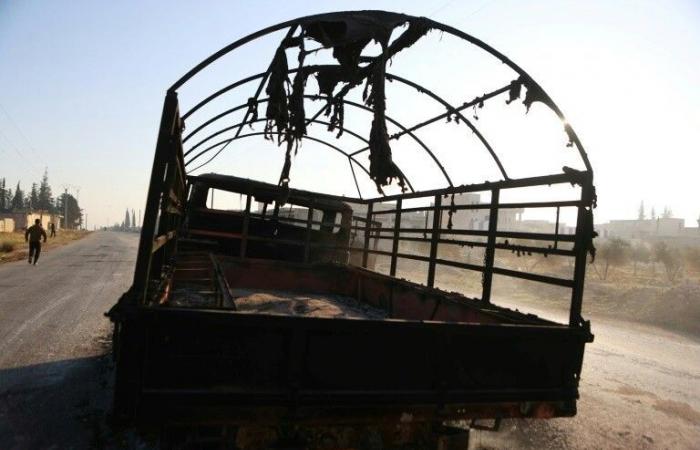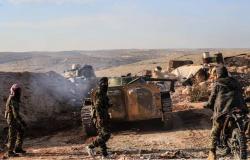The jihadists and their allies arrived on Friday at the gates of Aleppo, Syria's second city bombed for the first time in four years, after two days of a dazzling offensive against the regime which left more than 255 dead, according to an NGO .
The Syrian Observatory for Human Rights (OSDH) announced that around fifty localities had been conquered by the jihadists since Wednesday.
These are the most violent clashes since 2020 in northwest Syria, where the province of Aleppo, largely in the hands of Bashar al-Assad's regime, borders the last major rebel and jihadist stronghold of Idlib. .
A security official indicated that the Syrian army had “sent reinforcements” to Aleppo and assured that the attackers “did not reach the limits of the city”.
According to the OSDH, the Hayat Tahrir al-Sham (HTS) group and allied groups, some close to Turkey, reached the gates of the city on Friday morning. The fighters “entered the outskirts of Al-Hamdaniya and New Aleppo in the city of Aleppo after carrying out two suicide attacks with car bombs”, according to the NGO.
During the civil war which broke out in 2011, regime forces, supported by the Russian air force, in 2016 recaptured the eastern part of Aleppo, the large city in northern Syria, from the hands of the insurgents thanks to devastating bombings.
Residents of Aleppo, contacted by telephone by AFP, expressed their concern.
“For the first time in almost five years, we hear rockets and artillery shells all the time, and sometimes planes,” said Sarmad, a 51-year-old man.
“We are afraid that the war scenario will repeat itself, and that we will be forced to flee our homes,” he added.
OSDH, a UK-based NGO with a vast network of sources in Syria, reported 24 civilians killed in total, including 19 on Thursday in Russian airstrikes on rebel areas.
An AFP correspondent on the rebel side reported intense fighting around Aleppo on Friday.
He said he saw the attackers in a town seven kilometers from Aleppo, advancing with armored vehicles. The fighters claimed to receive orders from a common operations room.
– “Panic” –
Fighters bombarded Aleppo for the first time in four years, targeting the university campus where four civilians were killed, according to the official Sana agency.
“Artillery shells targeted a university residence”, “causing panic”, indicated the OSDH.
“It is strange to see the regime forces receive such blows despite Russian air cover (…) Were the regime forces dependent on Hezbollah, which is currently occupied in Lebanon?” asked Rami Abdel Rahmane, the director of the OSDH, in reference to the war between Israel and the Lebanese movement, ally of Damascus, which ended this week.
Iran reiterated on Friday its “continued support” for Syria in the face of this offensive.
Iran is another staunch ally of Syria, where Tehran has engaged militarily by sending advisors, at the request of local authorities, to support President Assad during the civil war.
Thanks to this war, HTS, dominated by the former Syrian branch of Al-Qaeda, had taken control of entire sections of the province of Idlib, but also neighboring territories in the regions of Aleppo, Hama and Latakia.
According to the OSDH, the fighting reached the strategic town of Saraqeb on Friday, held by the regime and located south of Aleppo, at the intersection of two highways.
– Exodus –
The Russian air force has intensified its air strikes, according to this source. The Kremlin on Friday called on the Syrian authorities to “bring order as quickly as possible” to Aleppo.
In a press conference, the head of the self-proclaimed “government” in Idlib, Mohammad al-Bashir, justified the offensive on Thursday by saying that the regime had “begun to bomb civilian areas, which caused the exodus of dozens thousands of civilians.
The UN Office of Humanitarian Affairs (Ocha) indicated that “more than 14,000 people, almost half of whom are children, have been displaced” by the violence.
Northern Syria has benefited in recent years from a precarious calm made possible by a ceasefire established after a regime offensive in March 2020.
The truce was sponsored by Moscow with Turkey, which supports some Syrian rebel groups on its border.
The Syrian regime regained control of a large part of the country in 2015 with the support of its Russian and Iranian allies. Syria's civil war has killed more than half a million people and displaced millions.






